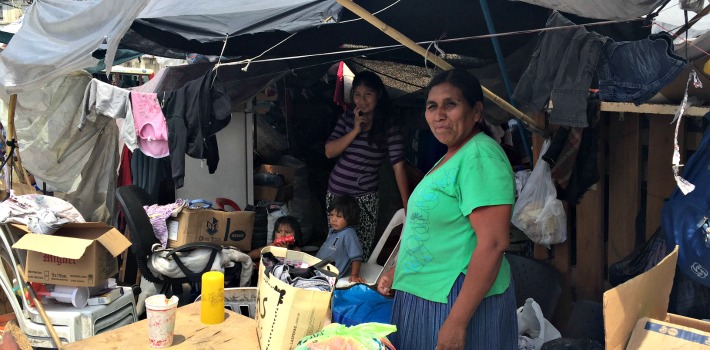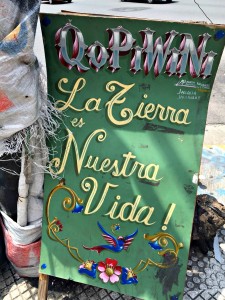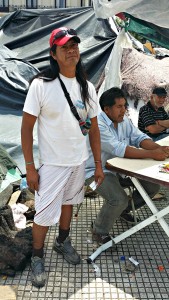
EspañolThe next president of Argentina, Mauricio Macri, will have much more to worry about than tackling the country’s problems related to high inflation, the fiscal debt, and systemic poverty.
For nearly nine months now, 25 representatives from Argentina’s indigenous communities — Qom, Pilagá, Wichi, and Nivaclé — have camped at the heart of Buenos Aires calling for a meeting with President Cristina Fernández de Kirchner to demand the restitution of land they claim once belonged to them.
Located a few blocks away from the Ministry of Social Development and the governor’s mansion, the encampment has a capacity of 50 and is covered by a sky-blue and white tent. The site includes seven portable toilets. Pots and pans with the remains of recently cooked food, worn mattresses, and clothes and bed sheets drying in the sun are easily seen from the street. Banners with inscriptions of resistance and flags with the colors of the indigenous communities also proudly garnish the area.
All of this contrasts greatly with the business suits and dress shoes that quickly pass through the outskirts of the business district at the intersection of May and July 9 Avenue.

The group’s leader, Félix Díaz, explained several months ago that they are at the campsite to demand the government’s return of land stolen from them decades ago. They also request, in reference to the right to self-determination, that the government notify them in matters concerning natural resources and compliance with the United Nations Declaration on the Rights of Indigenous Peoples.
“We want to return [to our community] with an answer. It’s what the women and ancestors of our community want. This encampment doesn’t have a deadline,” assured the spokesman for the Wichi tribe, Jorge Palomo, after completing six months at the site.
He also criticized the current administration: “They kill us with indifference and discrimination.”
Despite the Kirchner administration’s lack of action, the group finds support in ecological and social organizations, and universities.
“The government has searched for a way to divide the people,” Díaz maintains. “In 1979, we were dispossessed, when the province transferred our indigenous territory to the National Parks. We lost 50 hectares of land, which was very critical to us. No one knew how to lead the commission, because the tribe’s chief didn’t know how to read or write. Our chief unknowingly signed some papers, which ultimately transferred a part of our land to the government. He didn’t know what he was doing.”
For the Qom community, November 3 marked an important milestone: then presidential candidate and now President-elect Mauricio Macri visited the campsite and spoke with Díaz about the communities’ problems.
Díaz told Macri that he has tried to meet with President Kirchner for two years, but only managed to meet with officials that “continue to lie with unkept promises.”
According to the indigenous leader, Macri signed a pact stating that if he won the election, he would begin a dialogue with the indigenous peoples without intermediaries, and “leave the Institute of Indigenous Affairs in the hands of its people.”
“The Land Is Our Land”
Narciso Sanagachi, leader of the encampment, spoke with the PanAm Post about its demand for the restitution of land. Two street dogs sat by his side harassing onlookers.

“We’ve been here for a while demanding the land that is ours. Not once has the president met with us,” he says.
Concerning Marcri’s visit, he notes that “he was the only politician that approached us. But we’re not politicians. We come to reclaim our territory and nothing more.”
Sanagachi says that what they request is the government returning the territories that originally belonged to his ancestors. “The territory is ours; it belongs to all of the indigenous peoples. There was 5,000 hectares before the governor of Formosa stole 1,500 hectares in order to sell it. Now they want to take all of our land again to sell it. That’s why we are here. We are fighting.”
He also says that the governor of Formosa province, Gildo Insfrán, wants to make deals “with other countries.”
“We don’t have title to the property [of our territory], because in that epoch the government never gave the tribe’s chief title to the territory. Now, people enter the area without permission, because there is no title. But it was always our land.” Sanagachi adds.
The camp’s leader also says that, in June, they conducted a protest which was attended by representatives of 15 provinces with indigenous peoples. “When the summit finished, we marched in front of the Casa Rosada [presidential estate] to deliver our demand. Cabinet Chief Aníbal Fernández and Minister of the Interior and Transportation Florencio Randazzo were there,” he says. “They spoke for 10 minutes and later said ‘we are going to return,’ and when they left the demonstration, the officials never came back.”
[adrotate group=”8″]
A representative in Buenos Aires said there are instances of “hunger, sickness, and fever that pass through the campsite. He added that children are living at the camp and “are not going to school.”
When asked what the groups need from society, he responded with a pamphlet that they usually distribute to people interested in their cause. The pamphlet reads: “We are searching to add hearts to the defense of a way of life different to capitalism. We look forward to meeting you and hope that you accept us.”
The Solution: Property Rights
Writer and judge Ricardo Rojas tells the PanAm Post that these groups are seeking for a way to have their territories recognized, because they were traditionally part of their lands, but that their communities lacked the concept of property rights.
“I don’t know if title to property is of any interest to them,” he says. “How do we assure them that they can continue living there? I don’t think they want title in order to sell it. The idea is to recognize the territory as theirs. I imagine you could resolve the issue with a land reservation as the United States did, although they created reservations for the purpose of surveying the land. Here, we would do it to guarantee the lands remain with the indigenous people,” Rojas explains.
For Rojas, the problem starts with the lack of a definition of rights, but the magistrate sustains that the original communities have land by tradition.
“They don’t have rights of registered properties. In theory, the lands are public lands, and the Chaco government [and Formosa] has taken it from them. It’s a problem with no easy solution, because the land value has increased. That’s why the only solution they have is to establish rights to property, whether it’s a reservation or granting the land to them individually. Otherwise, the government will continue taking it,” he concludes.
 Versión Español
Versión Español












